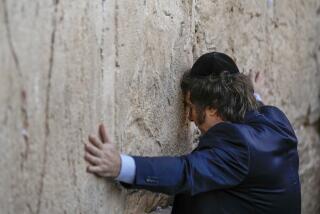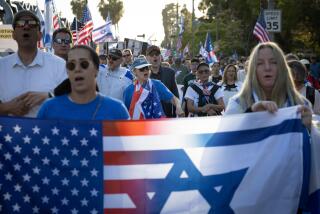Italy’s Tiny Jewish Community Faces ‘Crisis of Identity’
ROME — The tensions pitting Orthodox Jewish traditionalists against more secular Jews, which have created political crises in Israel and threatened to divide the large Jewish community in the United States, have also been simmering for the last year in Italy’s tiny Jewish community.
The tensions threatened to boil over at last month’s quadrennial policymaking meeting of the Union of Italian Jewish Communities as rabbis warned of a “profound crisis of identity.”
But the 35,000-member Italian Jewish community appears to have emerged from the meeting with a renewed commitment to compromise that leaders hope will enable different religious trends and traditions to coexist under an umbrella of unity.
The meeting elected a new governing board for the union, which on July 13 named Venice-based physician and scholar Amos Luzzatto as president.
Luzzatto, 70, replaces Tullia Zevi, who stepped down after an unprecedented four terms of office. During her presidency, Zevi spoke out forcefully against racial and ethnic intolerance and became a high-profile voice of moral authority in Italy.
Little known outside the Jewish community, Luzzatto appeals to a broad range of factions within Italian Jewry.
A respected secular intellectual and editor of a prestigious Jewish scholarly review, he also has a profound knowledge of Jewish religious traditions and is descended from a prominent rabbinical family.
“I’m not fooling myself, but I think that the different positions can come closer,” Luzzatto said. “I’m not an angel who fell from heaven, and I have a term of four years ahead of me, but I’m confident that it will happen.”
Italy’s Jewish community is nominally Orthodox, and there are no Reform or Conservative congregations or rabbis. As in other European nations, Jews join community organizations rather than congregations.
At the same time, however, most Italian Jews are not observant, and even observant Jews are traditionally highly acculturated, with a strong Italian as well as Jewish identity. The intermarriage rate is 50% or more.
Controversy over the conversion of children of mixed marriages has been a flash point for tensions.
*
Italian rabbis, however, feel the conversion issue is the tip of an iceberg. Italy’s secular Jews, they argue, are losing sight of what it means to be Jewish. The rabbis have been joined in recent years by younger Jews who returned to strict observance and became increasingly militant in criticizing secular Jews. Secular Jews in turn have branded these new traditionalists as “fundamentalists.”
“There is a profound crisis of identity in our community,” Milan Rabbi Giuseppe Laras, president of Italy’s Rabbinical Assembly, warned at the union’s congress. “Despite lively signs of Jewish interest, there are signs of abandonment, more widespread than ever before, and even more dangerous because they involve the social and family structures.”
Complicating matters has been Italian Jewry’s unique historic status in Europe. Jews have lived continuously in Rome for more than 2,000 years, making theirs the oldest Jewish community in Europe. The special “Italian” religious rite predates that of Sephardic or Ashkenazic Jews, the main ethnic streams of Jews.
But there is also wide diversity among the community’s small numbers.
Zevi said such divisions and conflicts should not be exaggerated.
“We are a community that defines itself as Orthodox,” she said. “In Italy we do not have a liberal Judaism, but what is important is to respect the existence of different degrees of intensity of observance, including those who observe all 613 commandments.”
More to Read
Sign up for Essential California
The most important California stories and recommendations in your inbox every morning.
You may occasionally receive promotional content from the Los Angeles Times.










